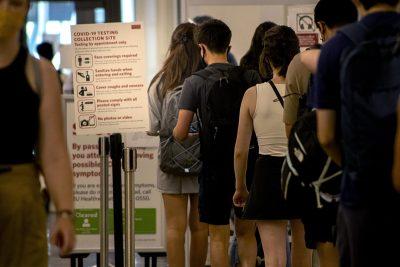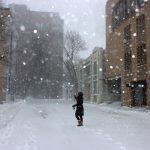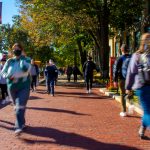
Boston University recorded 137 cases of COVID-19 last Tuesday — the highest single-day number of cases since testing began in August 2020. BU also registered a positivity rate of 3.09% — around 13 times the average rate at the time.
The spike in COVID-19 cases on campus comes amidst the spread of the new Omicron variant, which has become the dominant virus strain in the United States.
Judy Platt, BU’s chief health officer and director of Student Health Services, said the increase in cases is likely due to the spread of the Omicron variant, but also hinted that indoor holiday celebrations may have played a role.
“I think we would have seen increases regardless after Thanksgiving break, but the Omicron surge is really what is responsible at BU, in Massachusetts and across the country,” Platt said.
Massachusetts has witnessed a surge in COVID-19 cases since late November with a weekly positivity rate of 6.8% as of Dec. 20. In Boston, the positivity rate has climbed to 9.5% from 4% during the same time frame.
Nearby institutions, such as Emerson College and Harvard University, have already announced plans to start their Spring semesters remotely to avoid the further spread of COVID-19.
As of yet, BU has not made any changes to the Spring semester and plans to continue in-person education.
Sara McMahon, a sophomore in the Questrom School of Business, said she does not want to return to remote learning, adding she believes BU does a good job of testing regularly to protect those in the community against infection.
“BU is one of the more COVID-conscious schools,” McMahon said. “I feel, in comparison to some other schools, we have a better chance of staying on campus and staying healthy.”
Nive Sujin, a sophomore in the College of Arts and Sciences, said the spike in cases makes her “a little anxious” about the upcoming semester.
“Obviously, that can impact how classes are,” she said. “But I’m just hoping that they don’t shut down too much student activities or anything.”
Sujin said the University should continue a strict mask and booster shot mandate but added she believes it should offer hybrid learning options as it did during the 2020-21 academic year.
“Making it so that students’ only option is to go into a classroom if they are immunocompromised or sick during a pandemic is not great,” Sujin said.
The University recently mandated students, faculty and staff must receive a booster shot by Feb. 4. The University also announced that it will remove its daily COVID-19 symptom attestation with indications that the green badge system will be removed as well.
While breakthrough cases can still occur in vaccinated individuals, a press release issued by Massachusetts Department of Public Health on Dec. 20 showed that 97% of these cases have not resulted in hospitalization, serious illness or death among individuals under 60.
“That’s really important news, particularly for our students on campus,” Platt said. “As we have seen more cases, I think that has caused people to feel like the vaccines don’t work. The vaccines are absolutely working.”
While McMahon believes the spike in cases on campus is somewhat “jarring”, she is still ready to return to campus next semester.
“Being on-campus, I feel a lot safer with COVID than when I’m outside of campus because I know everyone’s getting weekly tests and, for the most part, everyone has their vaccine,” McMahon said.
As of Dec. 25, BU has over 96% of students, 98% of faculty and 93% of staff vaccinated against COVID-19.
Platt said “several hundred students” on campus are being tested regularly over Winter Intersession, adding once students, faculty and staff return to campus in the Spring, they should get tested and stay in place until they receive a negative test result.
“We know that everyone will have traveled to some degree so getting that test and scheduling move-in as soon as you are able to… is really going to be critical to keeping spread down in the Spring semester,” Platt said.




